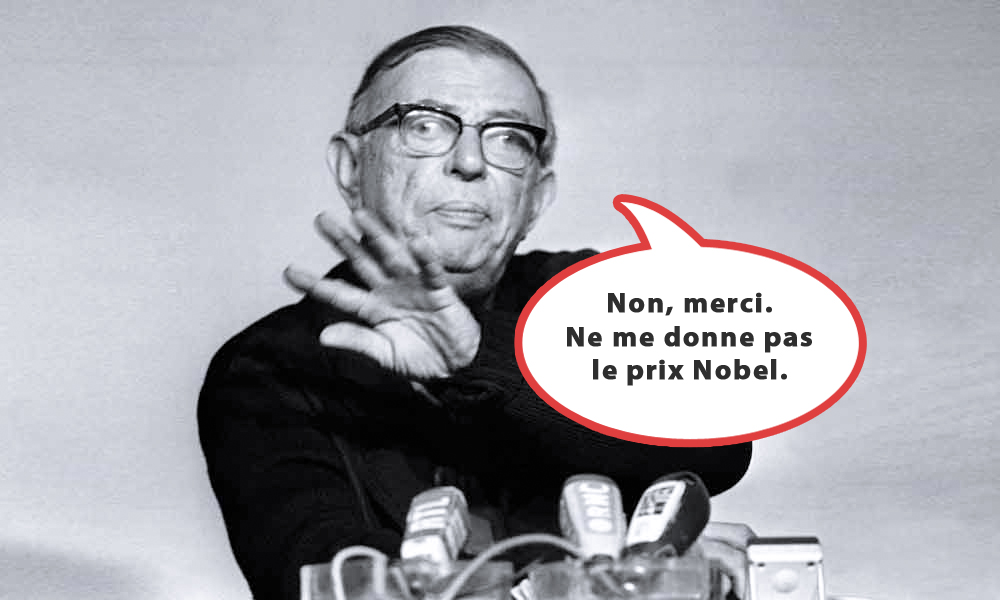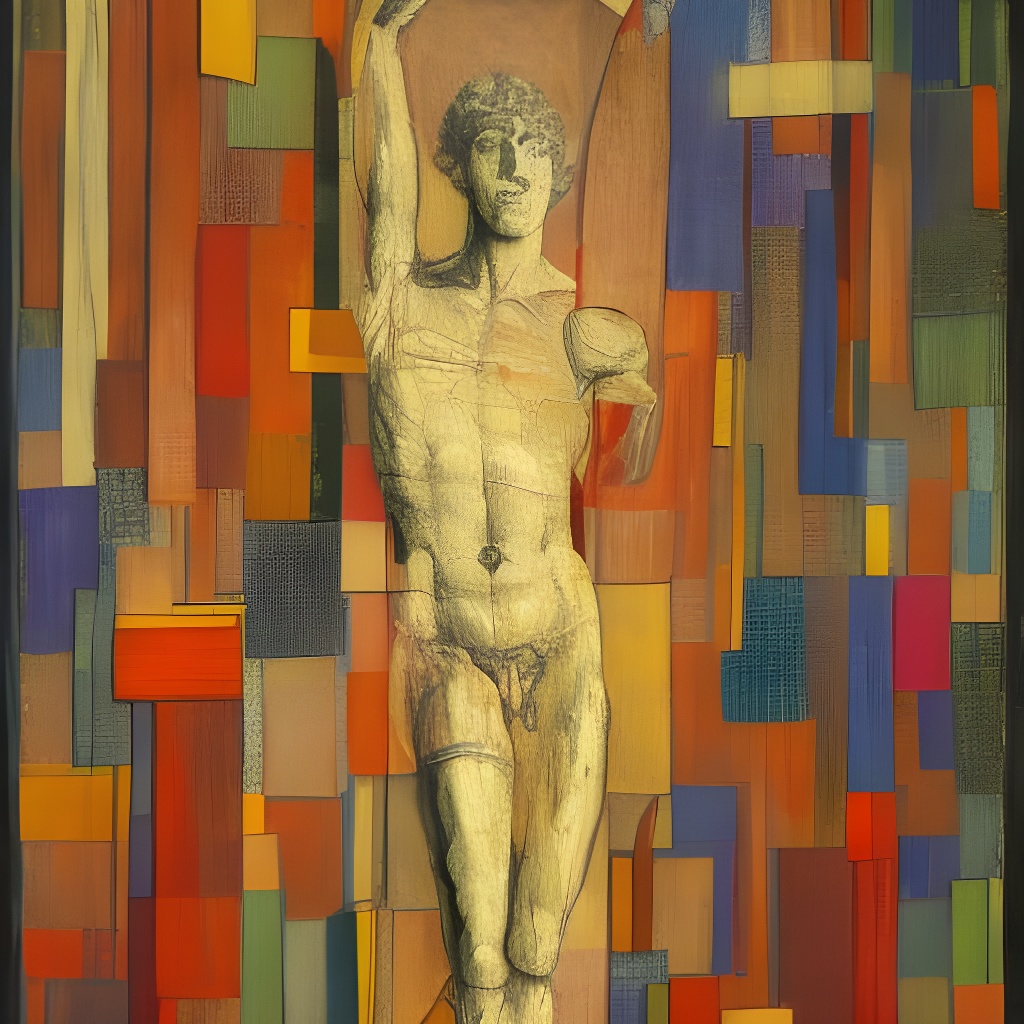Sartre – freedom, existence, and the Nobel Prize
When Jean-Paul Sartre was awarded the Nobel Prize in Literature in October 1964, he turned it down saying that he refused official distinctions and did not want to be “institutionalised.” For years, he had consistently rejected prizes, including the Légion d’honneur, the highest honour bestowed by France on its citizens.
Sartre, arguably the most famous French philosopher of the 20th century, was fiercely vociferous on individuality and on forming our own essence. The Nobel Prize in Literature was, in fact, awarded to him “for his work which, rich in ideas and filled with the spirit of freedom and the quest for truth, has exerted a far-reaching influence on our age.”
Existence precedes essence
“Existence precedes essence”, he famously formulated in his 1945 lecture Existentialism is a Humanism (subsequently published in 1946). First, we come into existence, we are thrown in the world (as Heidegger would say), and then, through exercising our freedom, we find and define who we are. In layman terms, first we pop into existence, and then we have to mold our own shape through our free choices. When Sartre speaks of forming our own essence, he is speaking of a life-time spent exercising free will to define ourselves.
This goes contrary to what, for centuries, was taken matter of fact. In India, for example, the ancient caste society decides what you are based on what your ancestors were. Generation after generation, individuals are stuck in a stratum until the day they die. If you are born the child of a servant, then you will be a servant. In a hundred and fifty years, your children will also be servants like you. For centuries, society in the West functioned in a very similar way. If you were born a peasant, you would die a peasant. Your chances of becoming a king were more or less nil. Kings were (and still are) made out of an intensely restricted group of people. Essence came before existence. Even before you are born, you already have your social place written in stone. That place was part of the divine order of things, unquestionable and given by God himself.
The French revolution, and the social turmoils that followed, started to turn this over its head. Finally, Sartre’s existentialism gives the new philosophy a concrete voice. You are born first; you come into existence. Then, through your choices, through exercising your free will, you build who you are.
Condemned to be free
To see this in context, we must keep in mind that for centuries, our essence — what makes us us — was something determined by society. One born the child of servants would grow up to be a servant. Similar orders existed in other places, too, such as within the Indian caste system. The world revolved around notions of class and state, both of which were considered as constituting the essence of what we are.
The essence of a chair would be that we can sit on it. That of a pen, that we can write with it.
For Sartre, our essence is not something we are born with, but something that we grow and develop ourselves.
We are born in this world free to make ourselves. The implication is that our choices fall squarely on our shoulders. This is a substantial responsibility. It is equally empowering and intimidating; to quote Spiderman, “with great power comes great responsibility.” Likewise, with great freedom comes great responsibility.
We are, in a sense, “condemned to be free.” If we do something without having a choice, then we are forced to do it; the burden of the act is not on us. However, if we do something out of free will, because we will it, then the responsibility of that act is ours to carry. So, while freedom sets us free, it also forces us to shoulder the weight of our decisions or indecision.
God’s absence
Like Nietzsche before him, Sartre rejects the existence of God. His views follow that rejection.
Existentialism proper would find its feet within the first half of the twentieth century, between Germany and France, influenced in no small part by Nietzsche’s writings. Only a few decades before Nietzsche, France would begin its long grapple with revolutions against the ancient divine order of things. It would be a movement that would slowly and surely sweep across other European countries.
Sartre was an atheist – perhaps the most famous atheist philosopher of the 20th century. A young Sartre would pour over Nietzsche’s works, and his subsequent works would be influenced by the death of God.
For centuries, we had a set of divine commandments telling us what should and should not be done: do not kill, do not lie, do not steal, go to Church, etc. These have now lost their divinity. Yet, even so, a sense of good and bad has not disappeared along with them. Somehow, we feel we need some sort of knowledge to, perhaps, be better people, be able to make the right choices.
God’s absence… the scientific revolution… a more naturalistic view of the world… the political turmoil in Europe leading a displacement of the ancien régime (the old guard of aristocracy)… the brutality of the first and second world wars, with their senseless killing of millions. Existentialism would be a culmination of these. God’s death, his disappearance, takes with it traditional morality and heavenly ideas that we do good to please Him. In the absence of heaven and hell, what does living the good life mean? What should I choose, and based on what?
Ideas such as this had been floating for quite some time. Kant himself would say that morality is not something that should be handed down by religion. His categorical imperatives – universal rules that apply to everyone, everywhere, always – are moral absolutes that can be understood through the exercise of reason. The use of reason is described as the right method and tool that allows us to understand something that has absolute value.
Along with our essence, Sartre allows us to build our own morality. What makes me me, is something I decide.
Finding meaning in freedom
Heidegger, influential on early Sartre, presented the idea of us being thrown, as it were, in the world. We get hurled into this world, and then we find our feet. Our thrown-ness, according to Heidegger, is part of our facticity. There are things that we cannot change – things on which we have no influence and that are immutable: the facts surrounding our birth, the society we are a part of, our mortality. On this background of facticity, we can then decide who we want to be.
In this sense, facticity precedes essence. There are facts we have no control over, but then there is the space in which we can transcend: rise above and go beyond those facts. In a post-God life, devoid of intrinsic meaning and purpose, it is up to us to transcend and become the person we are going to be.
While espousing a highly individualistic philosophy, Sartre was also committed towards socialist philosophy. For a society to be truly free, he believed, its members need to live within a classless and stateless political environment.
Among other things, accepting the Nobel Prize meant that he would be associating himself with a particular social class. It would have been a self-defeating prospect for someone intent on showing us that we are all fundamentally free.



